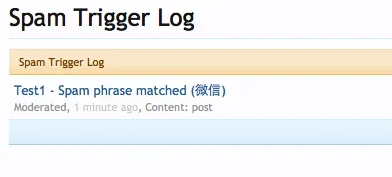I tried to block 微信 in the Spam Phrases, but I couldn't get it to block the posts.
The work-around is to make it a regular expression:
/微信/u
Additional documentation suggestion:
Also (as if you didn't have enough things to do!), I recommend that you create more extensive documentation and link to it from the adminCP, especially for Unicode matching. This Regex match seems to work without the /u, but others require it. It was not easy to figure this out.
The work-around is to make it a regular expression:
/微信/u
Additional documentation suggestion:
Also (as if you didn't have enough things to do!), I recommend that you create more extensive documentation and link to it from the adminCP, especially for Unicode matching. This Regex match seems to work without the /u, but others require it. It was not easy to figure this out.

